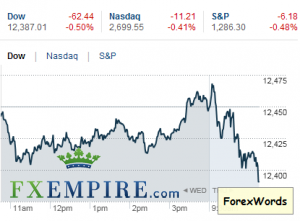Today’s economic data released in the US seems to contradict forecasts and economic gurus, who have assured the markets that the US was making steady progress to recovery. Retail sales climbed at the weakest pace in seven months in December and first-time claims for jobless benefits moved higher last week, signs the economic recovery remains shaky despite a pick-up in growth.
After all the noise and hoopla over Black Friday and Cyber Monday and the increase in sales reported by the majors, total retail sales increased 0.1 percent after rising by an upwardly revised 0.4 percent in November, the Commerce Department.
Economists polled by Reuters had forecast retail sales climbing 0.3 percent last month.
The upward revision for November sales suggests consumers had pent up demand and also completed their holiday shopping earlier and only returned to shop when retailer slashed profits at the end of the year on electronics. The government had initially estimated retail sales gained 0.2 percent in November.
In a separate report, the Labor Department said initial unemployment claims jumped to 399,000 in the first week of 2012, the highest in six weeks, from an upwardly revised 375,000 in the prior week.
The four-week average of claims also marched higher to 381,750 from 374,000.
The U.S. unemployment rate has fallen sharply in recent months and was 8.5 percent December, but some economists worry the drop has been due in part to discouraged workers dropping out of the labor force also retailers and shippers added large numbers to their payroll in expectation of larger sales during the holiday season.
U.S. stock index futures dropped earlier gains after the data, while U.S. Treasury prices turned positive.

Today’s US Economic Reports Unexpected
Two of the newest members of the Federal Reserve earlier this week signaled more help for the U.S. economy may be necessary despite recent data that suggested the recovery was picking up steam going into 2012. These unexpected numbers today may force the Fed into providing more help sooner than later. Still, the U.S. central bank is not expected to take any action on its next meeting on January 24-25.
Spending at electronics and appliance stores fell 3.9 percent in December, while shopping at department stores slipped 0.2 percent. Only the major retailers seemed to show significant gains. Electronics had one of the worst seasons ever.
Excluding autos, retail sales fell 0.2 percent, the first decline since May 2010. Sales at food and beverage stores fell 0.2 percent in December. The holiday season is usually a record month for food and beverage sales. Gasoline stations dropped, 1.6 percent last month unexpectedly December is usually a large travel month with shopping, holiday parties and family travel.
Markets will no doubt ably take these figures into consideration. The upcoming US economic reports will be closely watched, until it is clear that the US is continuing to recover or falling back into a recession.
Originally posted here



